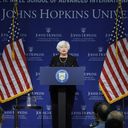Yellen's new strategy in U.S.-China economic diplomacy

U.S. Treasury Secretary Janet Yellen delivered a loud-and-clear message Thursday morning about the relationship between the United States and China: Tensions between the two superpowers are real and not going away, but this shouldn't stand in the way of a constructive economic relationship.
Why it matters: After a few months (and years) of frosty relations between the world's two largest economies, the Biden administration is trying to feel out the possibility of finding areas of limited, pragmatic collaboration.
- In particular, they are trying to assure Beijing that efforts to limit their access to advanced technologies are limited to those with national security importance — not part of a broader strategy to prevent China from becoming a more advanced economy.
What they're saying: "[T]hese national security actions are not designed for us to gain a competitive economic advantage, or stifle China's economic and technological modernization," Yellen said at the Johns Hopkins School of Advanced International Studies.
- "[T]he United States will assert ourselves when our vital interests are at stake," Yellen said.
- "But we do not seek to 'decouple' our economy from China's. A full separation of our economies would be disastrous for both countries," she added.
- It comes as the Biden administration seeks to work with other rich nations in the G7 to heighten safeguards around technology including quantum mechanics, artificial intelligence and semiconductors, as Axios' Hans Nichols reports.
Between the lines: There are policy areas in which there is no real hope of the two nations seeing eye-to-eye, particularly around Chinese support of Russia, and its aspirations involving Taiwan.
- Yellen's speech — and broader diplomacy with Chinese economic policymakers — aims to carve out areas less politically fraught and not shaped by zero-sum dynamics.
- It looks to recreate some of the communication channels that existed under Treasury Secretary Hank Paulson's "Strategic Economic Dialogue" in the 2006 to 2008 time frame. That allowed policymakers to carve out areas for constructive diplomacy away from hot-button national security topics.
- "As a foundation, we must continue to develop steady lines of communication between our countries for macroeconomic and financial cooperation," Yellen said Thursday morning.
Yes, but: There's no assurance the Chinese will bite. Overall relations between the two countries are far more strained than they were 15 years ago. Chinese President Xi Jinping has consolidated power in that time and views the United States as a rival that is trying to stymie China's ascendance.
- Even on areas that are less politically fraught, such as coordination on climate policy, China may elect to engage more with major world powers other than the U.S., given that stance.